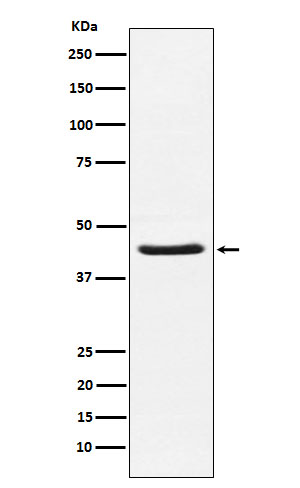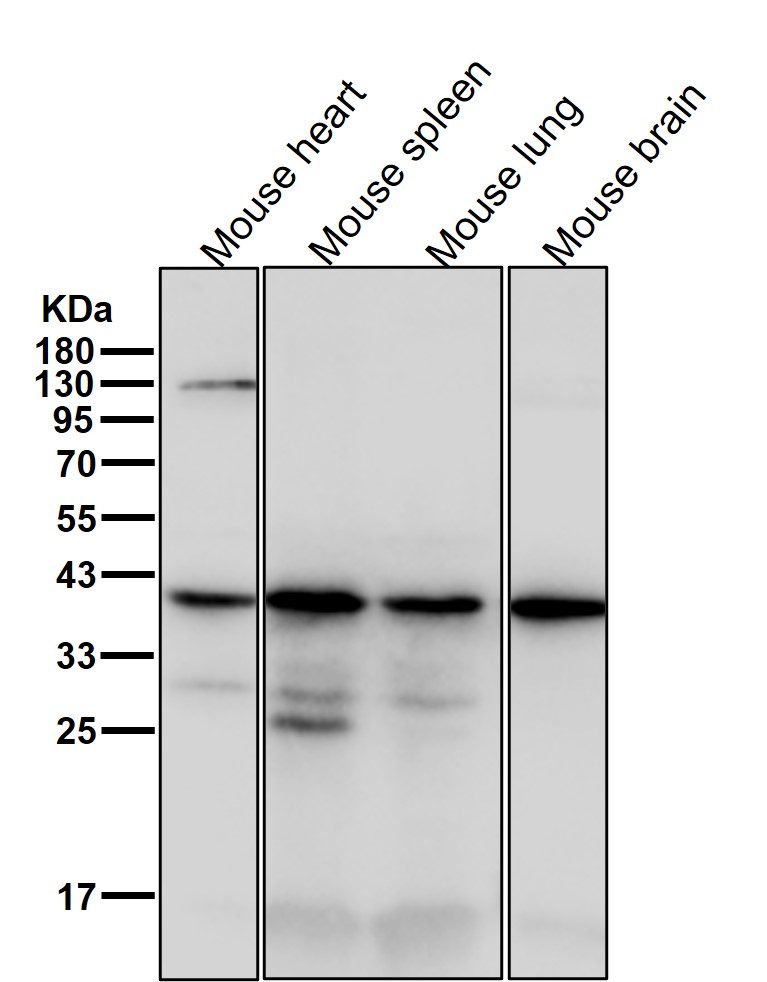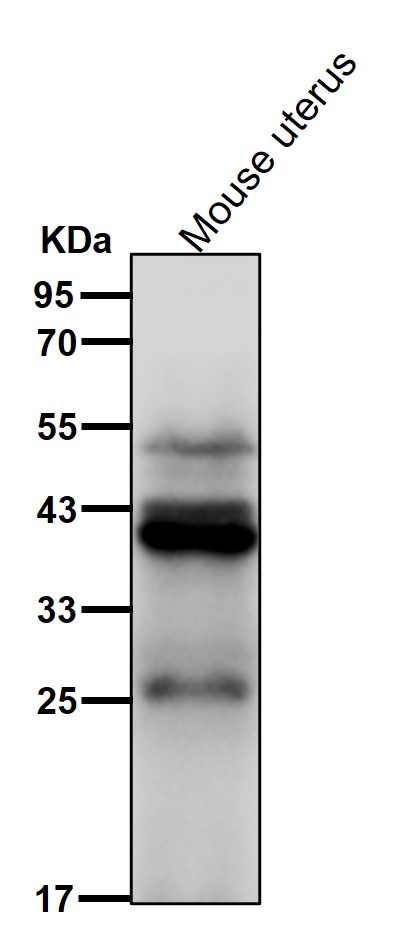


| WB | 1/1000-1/2000 | Human,Mouse,Rat |
| IF | 咨询技术 | Human,Mouse,Rat |
| IHC | 咨询技术 | Human,Mouse,Rat |
| ICC | 1/50-1/200 | Human,Mouse,Rat |
| FCM | 咨询技术 | Human,Mouse,Rat |
| Elisa | 咨询技术 | Human,Mouse,Rat |
| Aliases | 3-beta-HSD I; 3BETAHSD; 3BH; 3BHSD; HSD3B; HSD3B1; HSDB3; HSDB3A; SDR11E1;;HSD3B1 |
| WB Predicted band size | 42 kDa |
| Host/Isotype | Rabbit IgG |
| Antibody Type | Primary antibody |
| Storage | Store at 4°C short term. Aliquot and store at -20°C long term. Avoid freeze/thaw cycles. |
| Species Reactivity | Human |
| Immunogen | A synthesized peptide derived from human HSD3B1 |
| Formulation | Purified antibody in PBS with 0.05% sodium azide,0.05% BSA and 50% glycerol. |
+ +
以下是关于HSD3B1抗体的3篇参考文献,按文献名称、作者及摘要内容简要概括:
---
1. **文献名称**:*HSD3B1 expression in prostate cancer: A potential biomarker for androgen deprivation resistance*
**作者**:Hearn JWD et al.
**摘要**:本研究通过免疫组化(IHC)和Western blot技术,使用HSD3B1特异性抗体分析前列腺癌组织中HSD3B1蛋白的表达水平。研究发现,HSD3B1的高表达与患者对雄激素剥夺疗法的耐药性相关,提示其可作为治疗反应的预测标志物。
---
2. **文献名称**:*Immunohistochemical localization of HSD3B1 in adrenal and gonadal tissues*
**作者**:Rainey WE et al.
**摘要**:利用HSD3B1抗体对肾上腺和性腺组织进行免疫定位研究,揭示了该酶在类固醇激素合成细胞中的特异性分布。结果证实HSD3B1在肾上腺皮质和睾丸Leydig细胞中高表达,支持其在皮质醇和睾酮生成中的关键作用。
---
3. **文献名称**:*HSD3B1 genetic variant regulates protein stability and promotes tumor progression in breast cancer*
**作者**:Turcu AF et al.
**摘要**:通过Western blot及免疫荧光技术,结合HSD3B1抗体检测不同基因型乳腺癌细胞中HSD3B1蛋白的稳定性。研究发现,特定HSD3B1突变体导致酶活性增强,促进肿瘤细胞增殖,提示该基因变异可能通过影响蛋白表达驱动乳腺癌进展。
---
**备注**:以上文献摘要均基于HSD3B1抗体的实验应用,涵盖疾病机制及临床关联研究。如需具体期刊信息或发表年份,可进一步补充数据库检索(如PubMed ID)。
The HSD3B1 antibody is a crucial tool for studying 3β-hydroxysteroid dehydrogenase type 1 (HSD3B1), an enzyme essential in steroid hormone biosynthesis. HSD3B1 belongs to the 3β-HSD family, catalyzing the conversion of Δ⁵-steroid precursors (e.g., pregnenolone, dehydroepiandrosterone) into Δ⁴-steroids (progesterone, androstenedione), a rate-limiting step in producing active steroid hormones like androgens, estrogens, and corticosteroids. It is primarily expressed in steroidogenic tissues (adrenal glands, gonads, placenta) and peripheral target tissues.
Research using HSD3B1 antibodies focuses on its role in endocrine disorders (e.g., polycystic ovary syndrome, congenital adrenal hyperplasia) and hormone-dependent cancers (prostate, breast). Mutations or dysregulated HSD3B1 expression can alter local steroid levels, influencing disease progression or therapy resistance. For example, in prostate cancer, HSD3B1 variants (e.g., rs1047303) enhance androgen synthesis, correlating with poor outcomes in androgen-deprivation therapy.
HSD3B1 antibodies enable protein localization, quantification, and functional studies via techniques like Western blot, immunohistochemistry, and immunofluorescence. Their specificity helps distinguish HSD3B1 from its isoform HSD3B2. which shares enzymatic functions but differs in tissue distribution and regulation. These tools also aid in exploring HSD3B1’s potential as a therapeutic target or biomarker. Understanding HSD3B1’s mechanisms through antibody-based research remains vital for advancing endocrinology and oncology.
×